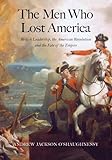The men who lost America : British leadership, the American Revolution, and the fate of the empire/ 2013
Language: eng Series: Lewis Walpole series in eighteenth-century culture and historyPublication details: New Haven : Yale University Press, 2013Description: 466 p.: ill.; 24 cmISBN:- 9780300209402
- 973.32
- 002 E 267 J14m 2013
| Item type | Current library | Home library | Collection | Shelving location | Call number | Copy number | Status | Date due | Barcode |
|---|---|---|---|---|---|---|---|---|---|
 Libro
Libro
|
Biblioteca Juan Bosch | Biblioteca Juan Bosch | Recursos Regionales | Recursos Regionales (2do. Piso) | 002 E 267 J14m 2013 (Browse shelf(Opens below)) | 1 | Available | 00000143907 |
pt. I. The view from London. "The tyrant": George III ; The prime minister: Lord North --
pt. II. Victory and defeat in the north (1776-1778). The peace commissioners?: the Howe brothers ; "The old gamester": John Burgoyne ; "The Achilles of the American war": Lord George Germain --
pt. III. Victory and defeat in the south (1778-1781). "The scapegoat": Sir Henry Clinton ; "Bagging the fox": Charles, Earl Cornwallis --
pt. IV. Victory against France and Spain (1782). "Saint George": Sir George Rodney ; "Jemmy Twitcher": The Earl of Sandwich.
"The loss of America was a stunning and unexpected defeat for the powerful British Empire. Common wisdom has held that incompetent military commanders and political leaders in Britain must have been to blame, but were they? This intriguing book makes a different argument. Weaving together the personal stories of ten prominent men who directed the British dimension of the war, historian Andrew O'Shaughnessy dispels the incompetence myth and uncovers the real reasons that rebellious colonials were able to achieve their surprising victory. In interlinked biographical chapters, the author follows the course of the war from the perspectives of King George III, Prime Minister Lord North, military leaders including General Burgoyne, the Earl of Sandwich, and others who, for the most part, led ably and even brilliantly. Victories were frequent, and in fact the British conquered every American city at some stage of the Revolutionary War. Yet roiling political complexities at home, combined with the fervency of the fighting Americans, proved fatal to the British war effort. The book concludes with a penetrating assessment of the years after Yorktown, when the British achieved victories against the French and Spanish, thereby keeping intact what remained of the British Empire"


There are no comments on this title.